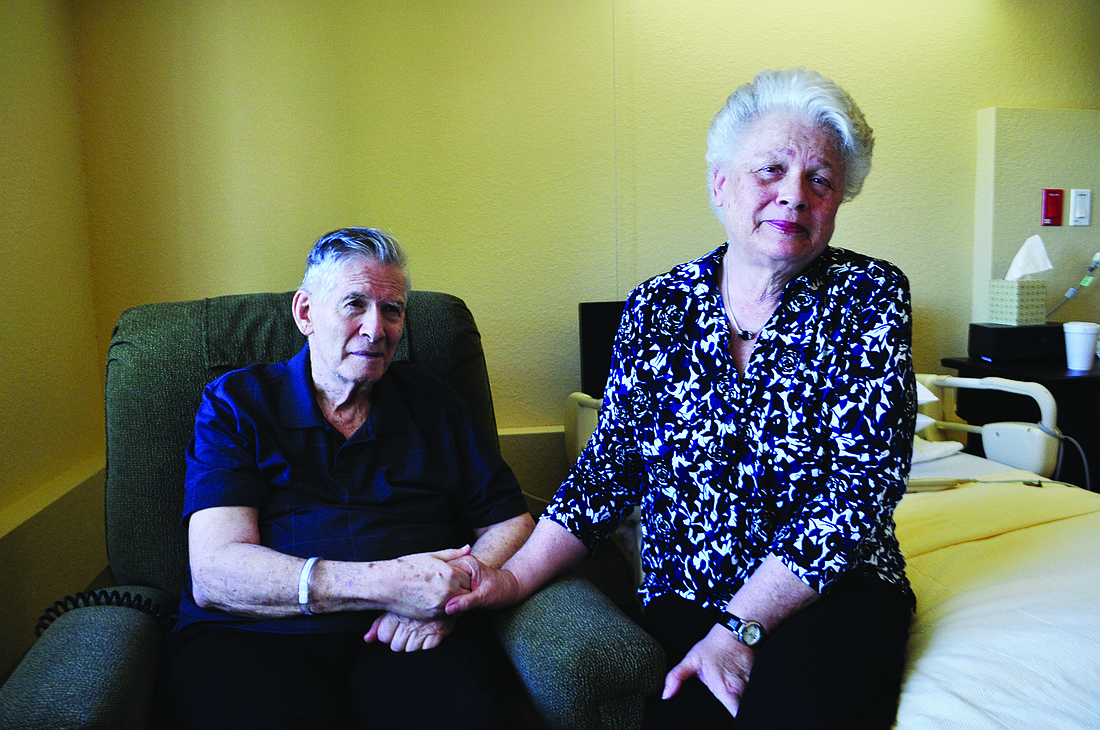- November 24, 2024
-
-
Loading

Loading

This article originally ran in the November 2014 Health Matters issue.
Once upon a time, Stephen and Joelle Green fell in love, raised a family and traveled the world together.
Now, Stephen rests in a recliner with his wife sitting on the bed beside him. She holds his hand and talks as if nothing has changed in 54 years of marriage.
But, over the last 12 years, the couple’s happily ever after has grown into a story of missing memories.
Stephen, 82, now lives in the Benderson Family Skilled Nursing and Rehabilitation Center in Kobernik-Anchin-Benderson’s Anchin Pavilion because his dementia progressed and his wife could no longer safely care for him at home.
“This is what I do,” says Joelle, who visits her husband six days a week. “He doesn’t reject it (when I hold his hand). It’s touch. I feel it’s important. We did a lot together.”
Joelle, 74, picks up her husband’s medicines from the Veterans Administration. She still does his laundry at home. She crushes his strawberries into a pulp so they don’t pose a choking hazard, and she keeps a stash of chocolate pudding — his favorite — in his bedside drawer in case the kitchen runs out.
As she gives her husband a sip of water, she watches as he tries to chew it.
“Swallow,” she says, rubbing his throat. “Swallow.”
She smiles as her husband responds.
“This is a slow grieve,” she says. “The person I was married to isn’t here anymore, but he is. This is the same sweet man. He can’t do what he used to.”
The changes began about 12 years ago, but intensified over the last six years. At first, Stephen had a hard time remembering things. Then, their children began to notice changes that Joelle either hadn’t noticed or for which she made excuses.
He forgot to pay bills and would get lost while driving.
“I started noticing notes, lots of notes,” she said. “He was trying to remind himself.”
Joelle had Stephen’s memory tested. By the third year, it had declined enough that he no longer could drive safely.
The couple continued to go out, although Stephen, a former pharmacist, became incontinent. He gradually became more interested in looking at lights and fans than conversing about some of his favorite topics, politics and religion.
Joelle continued caring for him at home until it was no longer safe to do so. He moved into Anchin Pavilion nearly two years ago.
“You think you are a super person, but you need support,” Joelle says. “Your friends are there for you, but they aren’t there living in your house. People have to ask for help.”
Joelle connected with a support group at Jewish Family and Children's Service, which she said is critical for a caretaker’s well-being.
“You talk with people going through the same thing,” she said. “We helped each other through this.”
Joelle plans to continue to visit her husband, whether he remembers her.
“I consider this part of our life,” Joelle says. “Our wedding vows are for sickness and in health, till death do us part. Am I happy he is like this? No. When (his dementia began and) he started (feeling down about it), I said, ‘There are worse things.’ I try to make it as positive as possible.”
SUPPORT GROUPS
• Church of the Redeemer — meets at 10 a.m. every third Thursday of the month, at 222 S. Palm Ave., in Gillespie Hall. Contact Harriet Stieff, 952-1765.
• Jewish Family and Children’s Service of the Suncoast — meets Wednesdays and Fridays, at the Jewish Family and Children’s Service Harry and Jeanette Weinberg campus, 2688 Fruitville Road. Call 366-2224.
• Palmer Ranch Healthcare — meets at 10 a.m. the third Wednesday of each month, at 5111 Palmer Ranch Parkway. Contact Susan Garbett, 358-1209.
• Sarasota Memorial Memory Disorder Clinic — meets at 9:30 a.m. every third Thursday of the month, at 1888 Brother Geenan Way, in the Dwyer building. Offers dual support group for mild cognitive impairment and early-stage patients and their families. Contact Kathleen Houseweart, 917-7197.
• Senior Friendship Centers Caregiver Resource Center — meets at 10 a.m. Thursdays, at 1820 Brother Geenan Way, Sarasota. Contact Paula Falk, 556-3268.
Caretaker Care
Research shows caretakers of persons with dementia have higher incidences of depression, falls, injuries and illnesses than non-caregivers.
Research shows that if caretakers have support services in place, such as help lines, support groups and counseling, then those risk factors are reduced, said Gloria Smith, head of the Florida Gulf Coast Chapter of the Alzheimer’s Association.
“(Data) also shows that caregivers who have that support network also delay placement of their loved one in a facility by almost a year and a half,” Smith said. “It’s very important. You can’t do this alone.”
Alzheimer's is a progressive, degenerative disorder that attacks the brain’s nerve cells, or neurons, resulting in behavioral changes and the loss of memory, thinking and language skills.
Dementia is a general term for loss of memory and other mental abilities severe enough to interfere with daily life. It is caused by physical changes in the brain.